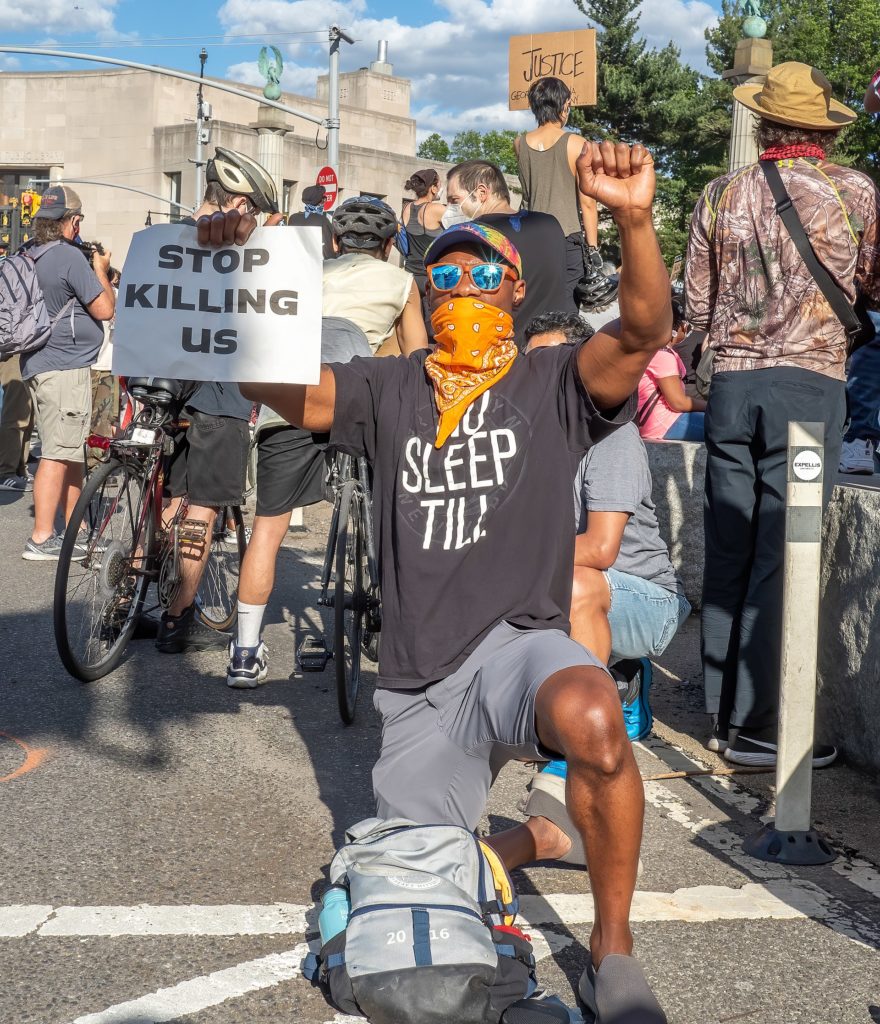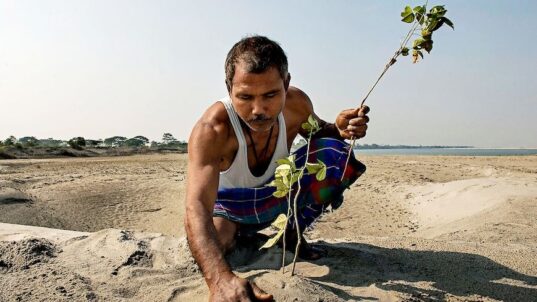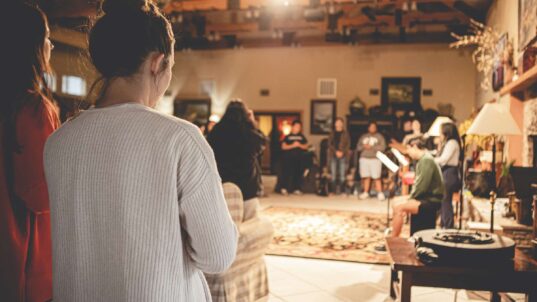
George Floyd protest in Grand Army Plaza, June 7, 2020. By Rhododendrites – Own work, CC BY-SA 4.0
Uprising in the Streets–What’s Rising Up?
Since the police killing of George Floyd, there have been uprisings and protests in the streets across the US and around the world. What do these events say to you? What do they reveal about law enforcement, public safety, and our society? What broader issues do they bring to mind relating to public safety and race? These are the questions that animated the first of our three-part Community Conversation Series on Public Safety, Race, and Society. These are exploratory and collaborative conversations. We’re trying to help each other to expand the way we might think about these topics. You’ll find a rough summary of our conversation below.
In our second Community Conversation on July 16th at 1pm-2:15pm EDT, we will work together to deepen and expand our exploration of public safety and community well-being. We’ll explore what we might mean by “public safety” (for whom?). What makes for “safe” communities? Where do these ideas come from? How might we expand our visions of “public safety”? Who, or what institutions, might play a role in “public safety”? To add your thoughts to the mix, please join us by registering here (it’s free!). This series, conducted via Zoom, is a collaboration of IONA, the DC Office on Aging, and the Interactivity Foundation.
Policing
- Police violence against people of color is a symptom of widespread, systemic, and historic racism that has too long gone unexamined and untreated in our country
- What’s the purpose of the police—what role do we want them to play?
- We struggle to envision other forms of public safety that are non-violent, that don’t rely on police violence
- We could abolish the police and start fresh
- We could defund the police and shift resources to other community-based responders (e.g. mental health workers, social workers, substance abuse specialists, etc.)
- We need some form of policing to protect communities against wrongdoing
- We need to rebuild trust in law enforcement
- Establish community-based policing, closing the gap between police and the communities they serve (hire from the community)
- Police hiring should have higher standards
- Establish better police training to de-escalate confrontations and to be more sensitive to persons of color and underrepresented groups
- Establish police accountability and transparency, with tracking of police violence and work histories
- Change the role of police unions, so they are involved in supporting positive reform and setting higher standards
Governance and the Health of Our Democracy
- The pandemic already made clear that we a crumbling as a democracy:
- Exposed unequal treatment of people of color, who face worse health outcomes
- Spirit of libertarianism, everyone out for themselves, defeats community spirit
- Each state is competing against other states rather than collaborating as one country—we’re like a nation of confederated tribes
- We lack leadership at the top that is motivated by a sense of common purpose
- Many in political power are playing it safe to not lose their positions, rather than doing what’s right
- The country is so divided it’s hard to imagine how we move forward together
- Partisan polarization stops progress: people oppose positive change because the other side proposes it
- Things don’t work in this country: our addiction to laissez-faire governance means we can’t solve our big problems
- We need stronger community leadership
- International comparisons: sense of embarrassment of how poorly our country is functioning and how similar we now seem to authoritarian states in Latin America or elsewhere
- All people need equal access to quality education, housing, healthcare—the pandemic highlighted how we fail on this for people of color
- We need more democratic participation, more active voters: positive change will come from winning elections
- We need younger generations to be electorally engaged to make political change for a more racially just society (maybe old White people should get out of the way and let the youth lead?)
Historical Dimensions
- Our country was born in racial violence and police brutality is a condition of our inherently violent and racist system
- There are deep historical roots of racism in our country, yet we are willfully ignorant of this past
- We have a long history of police violence, but since we ignore it, it continues and grows
- Reparations—we need to repair what our country has done to Black Americans by providing money and by publicly acknowledging the crimes of our past and present
- Our country never finished the work of Reconstruction after the Civil War, so we’re dealing with the consequences
- White America failed at Reconstruction, so White America acts out of guilt in demonizing those they have harmed (Black Americans). The police are essentially doing what White America asks in acting with violence against people of color.
- The social contract for our country was broken by White America
- White America is lucky that Black America wants justice, not revenge
- We need truth and reconciliation—honest conversations about racism and our history
- Jim Crow, open policies of racial discrimination, is part of our living experience, not something back in history
- We need to attend to the diverse historical experiences of different persons of color especially in light of how they’ve been treated by White America
- What is our historical moment? Is the arc of history bending toward justice?
- We need to pay attention and be active in repair of our broken country
- Can we use this historical moment of the pandemic to educate, motivate, and involve more citizens to make positive change?
Social and Cultural Dimensions
- Racism is and has been a powerful force in our country from the start
- We have caste systems of skin color (as other countries do), but we often pretend we don’t
- We need to break the mindset of fear and violence on the part of so many White Americans toward people of color
- Issues of identity and community—we get isolated in our community and forget about others or see them negatively
- Interactions across groups can help us bridge divisions, overcome fear, and get to know one another
- We have to have hard conversations about racism (in our families and social circles as well as in the nation as a whole), we have to face it honestly and work to end it
- Discrimination as a way to kill without violence
- Biases are reinforced by our education system, our healthcare system, our economic system, our criminal justice system, etc.
- We need to address various forms of discrimination and bias, whether in relation to race, gender, appearance, etc.
- Education and upbringing are key: raising anti-racist kids
- We need educational reform: train teachers to teach students to be anti-racists
- Break down segregation: people are raised to feel safe with “like” people, so if people are raised in less segregated communities, they’ll feel “like” more people
- Travel and international experiences are valuable—they can expand an inclusive spirit
- Generational considerations: younger generation is leading the way with anti-racist action. They have the energy for positive social change, perhaps older generations can offer their wisdom as guidance.
- Socio-economic considerations: economic class is also an issue. Majority of crime is against people of lower socio-economic standing, and people of color make up a disproportionately larger percentage of our lower socio-economic population.
- Gender considerations: why are more women than men taking part in this discussion today? What does this say about gender and racial justice?
Personal Dimensions
- Owning and dealing in a healthy way with our personal feelings of anger, shame, guilt, embarrassment, sadness, fear, and depression
- Some of us have to deal with the personal blow of encountering racism in other persons and in government—including the experience of living with Jim Crow policies
- How we respond to racism: there’s “the Ugly” in the world and it will weigh you down, but if you give in to hate, then “the Ugly” wins. You have to trust in something bigger, more positive, and more powerful than “the Ugly.”
- Feelings of being on both sides of the line, as a person of color who is sometimes treated as White and sometimes as Black
- Feelings of hope, inspiration, and appreciation, especially for the youth to set things right
- Confronting and addressing our personal biases about others: we all need to do self-work
- We are more likely to think of others outside of “our group” as the source of problems, more likely to feel negatively about them
- If we have sustained interactions with others outside of “our group,” especially as we’re growing up, we tend to be more open to others
- The feeling of scant resources makes us less generous and more hostile to sharing with others outside “our group”
- Grappling with internal contradictions and a range of emotions about what’s going on in our country regarding racism and police violence



